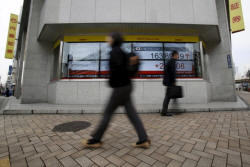Global shares extend falls on Trump trade threats
 Send a link to a friend
Send a link to a friend
 [August 31, 2018]
By Ritvik Carvalho [August 31, 2018]
By Ritvik Carvalho
LONDON (Reuters) - Global stocks fell for a
second day on Friday as a report that U.S. President Donald Trump was
preparing to step up a trade war with Beijing dampened risk appetite and
erased some of the gains made in a rally this week.
Trump is ready to impose tariffs on $200 billion more in Chinese imports
as soon as a public comment period on the plan ends next week, Bloomberg
News reported on Thursday. The White House declined comment..
The pan-European STOXX index <.STOXX> was down over half a percent [.EU].
The trade sparring weighed particularly on car stocks <.SXAP>, down 1.2
percent and the worst performers.
Trump also threatened in the same interview to withdraw from the World
Trade Organization if "they don't shape up" -- a move that would further
undermine one of the foundations of the modern global trading system.

"It's very hard to see a decisive resuscitation of risk appetite until
these tensions are resolved," said Paul O'Connor, head of the
multi-asset team at Janus Henderson Investors.
"We have learned to under-react to some of the individual headlines
because if you try to extrapolate from any of them you could find
yourself in big trouble."
Earlier in Asia, MSCI's broadest index of Asia-Pacific shares outside
Japan <.MIAPJ0000PUS> dropped 0.7 percent, set for a monthly drop of 1.5
percent.
The index has underperformed the MSCI All-Country World Index (ACWI),
<.MIWD00000PUS>, a gauge of the world's 47 markets, for four months in a
row as Sino-U.S. trade worries hit Chinese shares. The ACWI was down 0.1
percent on the day while the Shanghai composite index <.SSEC> was down
half a percent.
While trade jitters dominated market sentiment, indicators suggests
activity in the world's second largest economy remained firm. The
official Purchasing Managers' Index (PMI) showed growth in China's
manufacturing sector unexpectedly picked up in August after a two-month
slide.
The cautious market benefited the safe haven Japanese yen, which rose
0.6 percent on Thursday, its biggest daily rise in about six weeks. In
European trade, it was 0.2 percent higher at 110.47 per dollar <JPY=>.
The euro was 0.2 percent lower at $1.1650 <EUR=>, having shed 0.33
percent in the previous session. The common currency has recovered from
a 13-1/2-month low of $1.1301 hit in mid-August and is set to end the
month little changed.
[to top of second column] |

Pedestrians walk pass an electronic board showing the Japan's Nikkei
average (R) and other stock market indices outside a brokerage in
Tokyo, Japan, February 29, 2016. REUTERS/Yuya Shino/File Photo

Against a basket of currencies, the dollar was 0.1 percent lower. <.DXY>
EMERGING FREEFALL
Emerging market currencies were under pressure, with those of countries
that rely on foreign capital to finance their current account deficits
hit the hardest.
The Argentine peso <ARS=RASL>, the world's worst-performing currency
this year due to the country's poor economic health, fell 12 percent on
the day, bringing its month-to-date losses to 27 percent.
Argentina's central bank voted unanimously at an emergency meeting on
Thursday to raise its benchmark rate to 60 percent from 45 percent but
the unexpected move failed to stabilize the peso.
That knocked the Brazilian real <BRL=> to near the record low it touched
in September 2015. It is down almost 10 percent this month.
The Turkish lira, which has been hit by concerns over President Tayyip
Erdogan's influence over monetary policy and diplomatic spats with
Washington, also slipped toward record lows marked about two weeks ago.
The lira <TRYTOM=D3> bounced back about 1 percent to 6.5950 per dollar
in volatile trade. It has fallen 9 percent so far this week, hit lately
by reports that the central bank's deputy governor was leaving the bank.
In Asia, the Indonesian rupiah <IDR=> fell to a three-year low even
though the country's central bank said it was "decisively" intervening
to support the currency. The rupiah has lost two percent so far this
month.

The Indian rupee <INR=D2> hit a record low, having fallen 3.4 percent so
far this month.
Oil prices slipped. Brent crude oil <LCOc1> traded over half a percent
lower at $77.33 a barrel while U.S. crude <CLc1> fell 0.7 percent at
$69.76 a barrel. [O/R]
(Reporting by Ritvik Carvalho; additional reporting by Helen Reid in
LONDON and Hideyuki Sano in TOKYO; editing by David Stamp and John
Stonestreet)
[© 2018 Thomson Reuters. All rights
reserved.] Copyright 2018 Reuters. All rights reserved. This material may not be published,
broadcast, rewritten or redistributed.
Thompson Reuters is solely responsible for this content. |